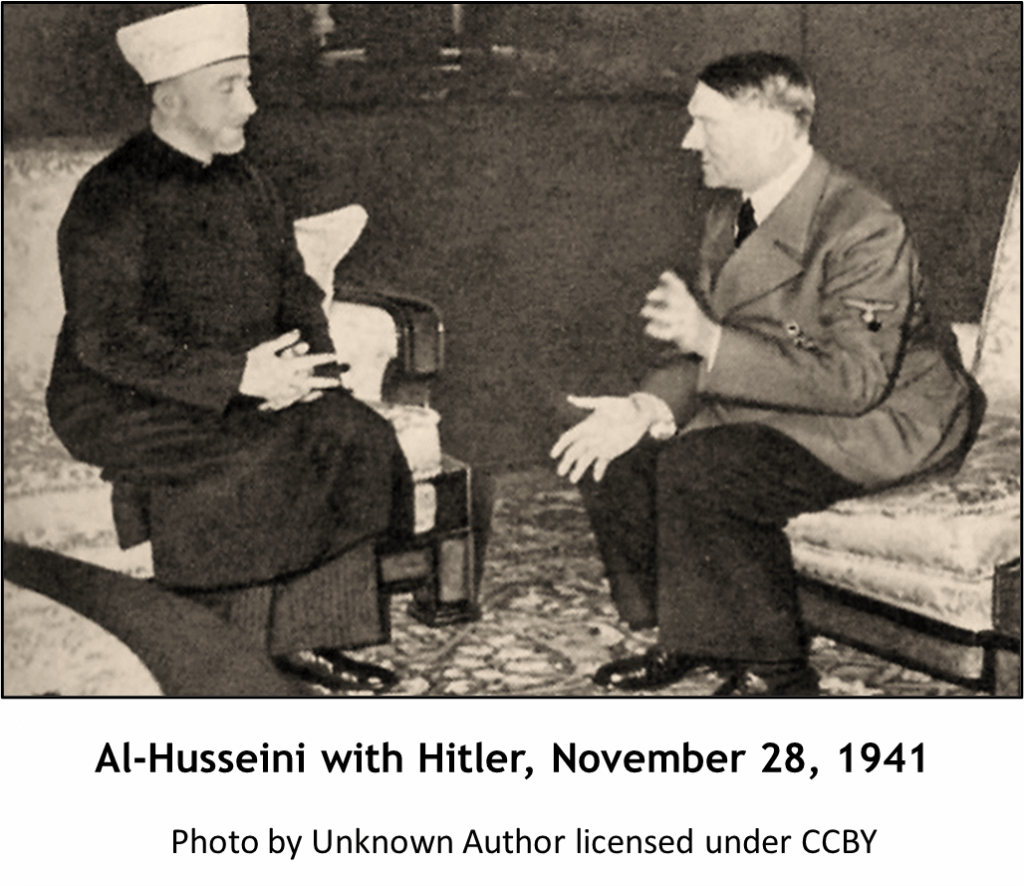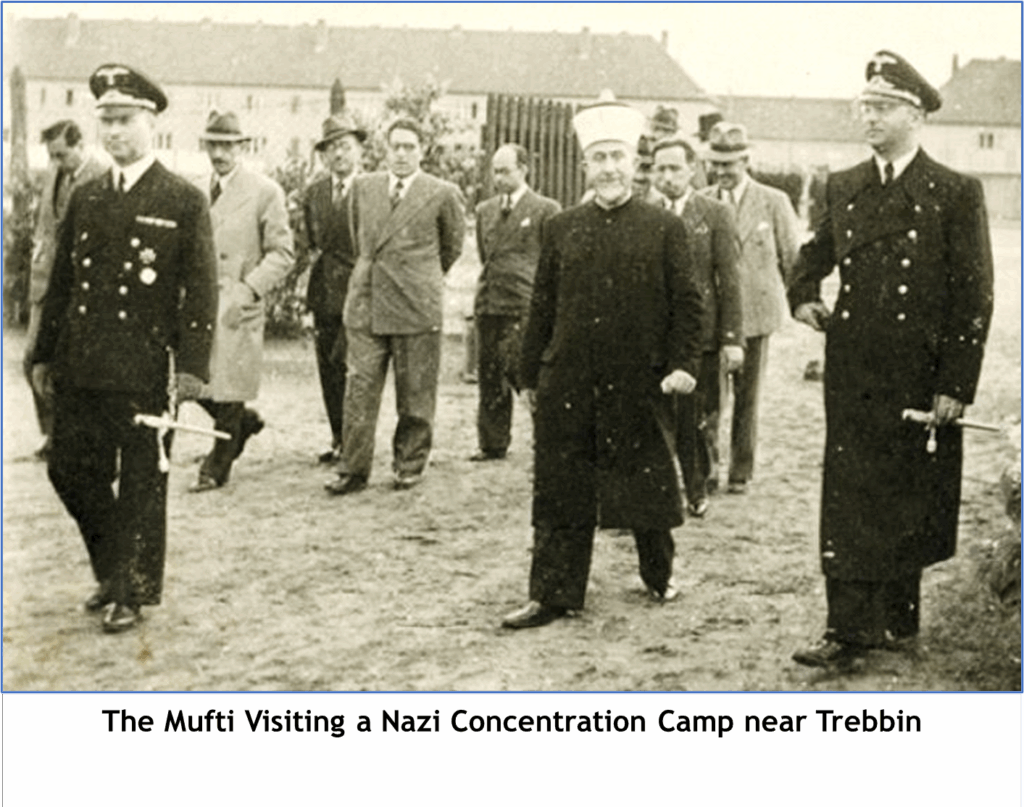The Mufti meets Hitler and accelerates Jihad
The saga of Yasser Arafat illustrates what happens when modern liberation ideology mixes with ancient jihadi religious beliefs. Here I want to add a sidebar that shows how deep and nefarious this blending really goes. The story begins with engagement between Jews and Germans that predates World War I.
First Came the Templers
Two decades before Theodore Herzl would issue a global call for Jews to return to their ancient homeland, a protestant theologian from Germany moved to Haifa, in Palestine, in 1869, with several dozen people called the “Templers.” Their name derived from scriptures that say followers of Christ are “temples” of the Holy Spirit. The Templers believed the second coming of Christ would be hastened by building a spiritual Kingdom of God on earth in the Holy Land.
In Haifa the Templers built a beautiful tree-lined main street (still there today), drained swamps to develop farmland, introduced steam-powered oil presses and flour mills, and opened European pharmacies and modern hotels. Their industriousness is said to have helped inspire new Jewish immigrants.
When the Nazis came to power in Germany, many Templers in Israel supported Hitler and even established a branch in Haifa in 1933. Hitler Youth and the League of German Maidens soon followed, and members openly greeted each other on the streets with “Heil Hitler” and the Nazi salute. Forty percent of Israeli Templers are said to have supported Nazism, comprising three-quarters of all Nazis in Palestine at the time. Most of them were deported by the British after war broke out between Germany and England.
Herzl Awakens a Vision of a Jewish Homeland
While the Templers were pursuing their messianic vision and flirting with Nazis, Theodore Herzl was being transformed into the visionary known as the father of modern Israel. Born in Hungary to a Jewish family that emigrated from Serbia, Herzl at first believed like his father that Jews could assimilate into European culture. This path seemed wide open when Jews were emancipated from antisemitic laws in Europe as the Enlightenment unfolded.
However, when the Austro-Hungarian Empire came unraveled and Marxist ideas began percolating in Europe in the mid-1800s, a new breed of antisemitism began to stir. Herzl recognized that this “new” antisemitism stressed the ethnic and racial character of Jews, not their religion. “It was not their suffering and weakness that sparked the new hatred—it was their success and their power, whether real or imagined.”[1] Herzl realized this approach left no way out of Jewish identity because Jews were deemed genetically inferior, a claim Germany would soon enough use to press for their eradication.
In 1896 Herzl published a visionary pamphlet called Der Judenstat, “The State of the Jews.” In it he declared the best way to avoid more waves of persecution was to create an independent Jewish state. He wrote with great zeal, altruistic optimism, and hope for the future:
The Jews who wish for a State will have it. We shall live at last as free men on our own soil, and die peacefully in our own homes. The world will be freed by our liberty, enriched by our wealth, magnified by our greatness. [2] Italics added
In their millennia-long wanderings, religious Jews prayed faithfully every Passover: “Next year in Jerusalem.” What was missing was their ancestral homeland. Herzl awakened a powerful vision that it was possible to reclaim the Promised Land in their lifetime. Even before Herzl, early Jewish Zionists had begun migrating to Palestine, many fleeing the Russian pogroms. They joined an estimated 15,000 or more Jews already living there under Ottoman rulers who had left the land famously barren. Subsequent waves of immigration were referred to as aliyahs (“ascent”). Returning home to Israel was always seen as taking a step up both in the world and toward God.
Herzl’s brilliant vision not only elicited a strong positive reaction among Jews. It also provoked a strong response from Arab Muslims who had a totally different dream and claim on the Holy Land.
Enter the Mufti of Jerusalem
A mufti is a Muslim expert in Islamic law empowered to give rulings on religious matters. Many cities where Muslims live have muftis even if Muslims are not the majority population. When the British were given a mandate to govern Palestine after World War I, they decided it would be politically expedient to appoint a Mufti of Jerusalem. Mohammed Amin al-Husseini, a 24-year old Arab nationalist, became the new Mufti of Jerusalem under the British Mandate. He was a descendant of the prophet Muhammad, which enhanced his stature among Arabs. He’d also served in the Ottoman army and was once jailed by the British for supporting an unsuccessful Syrian attempt at spreading pan-Arab nationalism—which should have hinted at more to come.
Al-Husseini was politically adept enough to convince the British he could serve their interests by helping maintain stability under their governing mandate. As things turned out, he reinvented himself as an advocate for Palestinian, rather than Syrian nationalism, and his appointment proved to cast a long shadow when the Nazis came to power.
The Mufti meets Der Führer
Al-Husseini labored to foster his own vision of Palestinian Arab nationalism by blocking further Jewish immigration to Palestine. In 1931, he founded the World Islamic Congress in Jerusalem, which installed him as the first ever “Global Grand Mufti.” In that role, he helped instigate the Arab Revolt of 1936-1939, which demanded Arab independence and an end to the British policy of open Jewish immigration. The revolt failed but it influenced Neville Chamberlain to present a White Paper in 1939 that limited Jewish immigration to 15,000 per year. The policy soon shut the door to many Jews, preventing them from escaping Nazi death camps.

After the revolt, Husseini fled to Lebanon, then Iraq, then Italy (where he met Mussolini), and finally Germany, where he forged contacts with the upper echelons of the SS. He recognized Germany as “the only country in the world that…has declared war on the entirety of world Jewry,” for which he said “Arabs feel profoundly connected to Germany.”
In February 1941, Al-Husseini submitted a draft declaration for German-Arab cooperation, hoping the Nazis would sign and make it public.The draft said Germany and Italy would recognize the right of Arab countries to:
…solve the question of the Jewish elements which exist in Palestine and in the other Arab countries, as required by the national and ethnic interests of the Arabs, and as the Jewish question was solved in Germany and Italy.[3]
The paper made it clear al-Husseini was intent upon eradicating Jews from Palestine altogether by any means possible. Later that year, he met with Hitler and reiterated his request in person. Hitler told the Mufti the time was not yet ripe for such a declaration, but he went on record saying their conversation constituted a secret agreement that Nazi forces would work with the Mufti to invade Palestine and liberate the Arabs when the time was right. Among other things, al-Husseini raised three Muslim army divisions to fight with the Nazis, making him the most ardent and prominent of all Arab collaborators with the Nazis.
The Mufti and the Concentration Camps
The Holocaust was already underway when Hitler met in person with al-Husseini. Al-Husseini also met with Himmler and Eichmann, and visited Nazi concentration camps. He is widely believed to have drawn up plans for a Nazi-style death camp to exterminate Jews in Nablus, in the heart of Israel, although hard proof for this claim remains elusive.
After World War II, the Mufti avoided prosecution by accepting political asylum back in his native Egypt. At the post-war Nuremburg Trials, Adolf Eichmann’s deputy Dieter Wisliceny said this about al-Husseini:
”The Mufti was one of the initiators of the systematic extermination of European Jewry and had been a collaborator and adviser of Eichmann and Himmler in the execution of this plan. He was one of Eichmann’s best friends and had constantly incited him to accelerate the extermination measures. I heard him say that, accompanied by Eich-mann, he had visited incognito the gas chamber of Auschwitz.”[4]

The Mufti Advises Arafat
It turns out al-Husseini and Yasser Arafat were related. Arafat’s mother was the daughter of al-Husseini’s first cousin. Soon after the Mufti returned to Egypt, the young Arafat became his protégé. Al-Husseini invited a former Nazi commando to Egypt to teach warfare. Under his direction, Arafat and others shed their first Jewish blood during raids against Israel in 1948.
In 1968, al-Husseini counseled Arafat to take over the PLO and “liberate Palestine” by supplying PLO troops to operate out of Gaza.[5] No doubt it was al-Husseini who also inspired Arafat to circulate an updated Arabic version of Hitler’s Mein Kampf (“My Struggle”). The introduction said:
Adolf Hitler does not belong to the German people alone, he is one of the few great men who almost stopped the motion of history…. Hence, he belongs to history. Hitler was a man of ideology who bequeathed…[a social and] ideological heritage whose decay is inconceivable. National Socialism…did not die… The Nazis turned it into the “Gospel of National Socialism.”
The unholy alliance between Al-Husseini and Hitler’s entourage ultimately inspired three generations of radical Palestinian leaders dedicated to the unholy grail of annihilating Jews to “purify the world.” Political parties in Egypt, Syria, Iraq, and Lebanon incorporated Hitler’s thinking, along with Holocaust denial fueled by an onslaught of antisemitic rhetoric, political cartoons and the discredited Protocols of the Elders of Zion.
Arafat’s successor as head of the PLO, Mahmoud Abbas, wrote a college thesis at the Soviet Institute of Oriental Studies in the 1980s. It was dedicated to serving the fight against purported global Zionist conspirators sabotaging the USSR. An abstract of Abbas’ thesis reveals his use of typical Soviet anti-Zionist propaganda concepts:

“Unmasking of the reactionary ideology and politics of Zionism constitutes a pressing task of all progressive, anti-imperialist forces and is inextricably connected with the defense of peace…democracy and social progress.” All honest people of the planet must fight…Zionism and antisemitism, which are fomented by capitalist reactionary forces. [6]
Abbas’ claim that Zionism is racist falls flat on anyone fairly informed of the fact that virtually no Jews today dare live in any of the Arab nations surrounding Israel while Arabs receive public welfare and education benefits in Israel, and are included in Israeli political processes. A Muslim Arab, Khaled Kabub, even sits on Israel’s supreme court.
Many Palestinian Arabs see Hitler’s obsession with purifying the world from Jews as a compelling model for furthering their own war of liberation. Nonetheless, Palestinian liberation was and remains ultimately based less on German or Soviet ideologies than on religious precepts drawn from the Quran and sayings of Muhammad.
[1] Shlomo Avineri, quoted in The Forward, by Liam Hoare, online, February 26, 2014. Avineri’s book Herzl: Theodor Herzl and the Foundation of the Jewish State, was published in 2013. It’s striking that Woke culture, influenced by Marxist-Socialist liberation principles in our time, also awakened aggressive antisemitism around the world.
[2] The Project Gutenberg eBook of The Jewish State, by Theodor Herzl, May 2008. In 1934, David Ben-Gurion echoed Herzl’s optimism when he told an Arab leader Zionism would bring a blessing to the Arabs, “giving them no good cause to oppose us.” The Arab said he preferred the land to remain barren another hundred years until Arabs were capable of developing it on their own. See Gilder’s The Israel Test, 2024 edition, p 72.
[3] Bernard Lewis, The Jews of Islam, Princeton University Press, 1984.
[4] https://www.firstthings.com/article/2005/08/hitlers-mufti
[5] Ibid. The troops were provided by Fatah, the PLO’s political wing.
[6] https://www.tabletmag.com/sections/arts-letters/articles/mahmoud-abbas-soviet-dissertation. In 2025, an article in the Jerusalem Post quoted Abbas as saying, utterly remarkably: “In the Noble Quran–and I believe that also in other divine books–it says that the [First and Second] Temples were in Yemen,” he said. “People who like reading about religion can check it out.” “[The Jews say:] ‘This is ours and that was ours, and this is where Solomon’s Temple was,’” Abbas added. “I am telling you, a large part of history is falsified. People who read the Quran know this.”
Leave a Reply